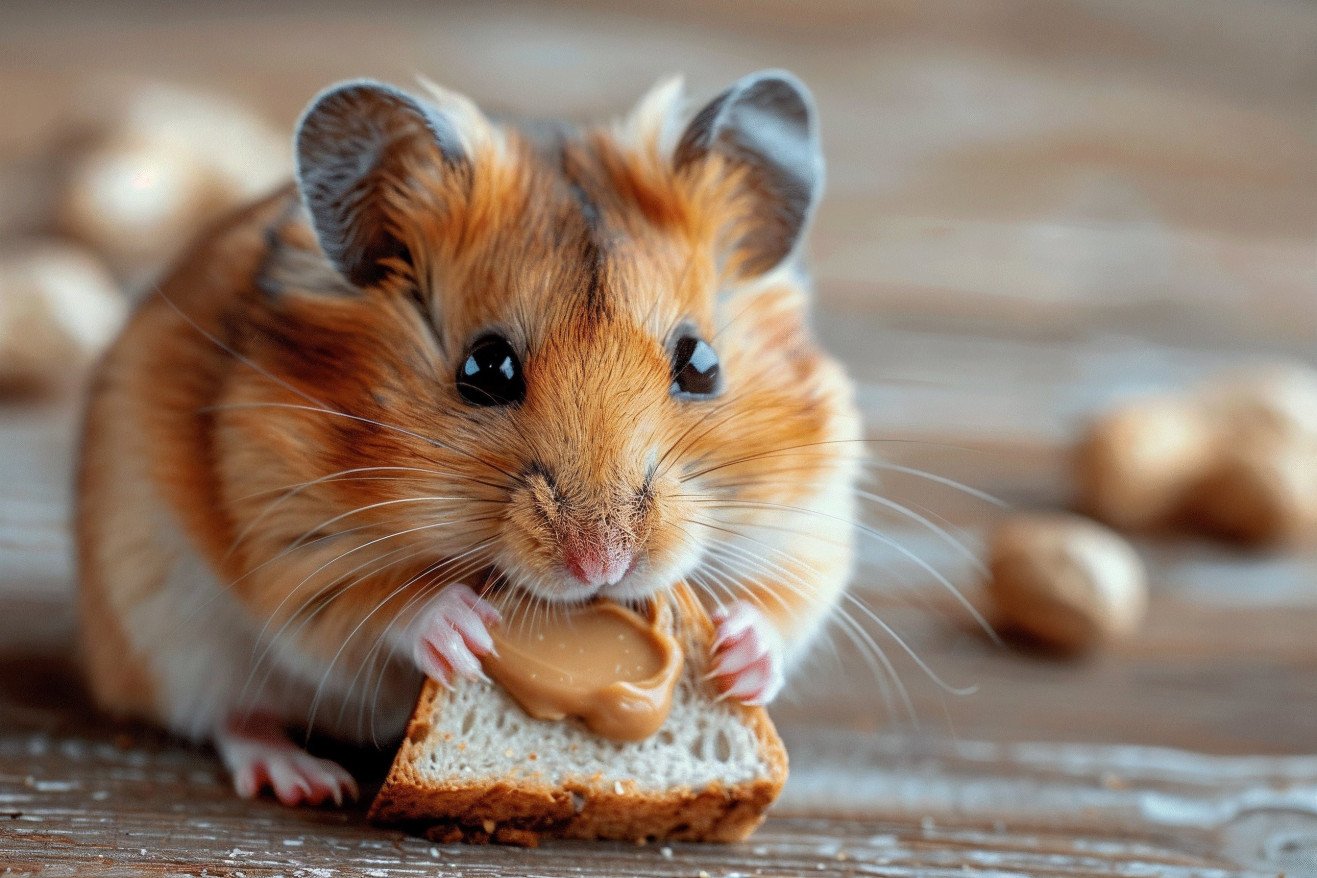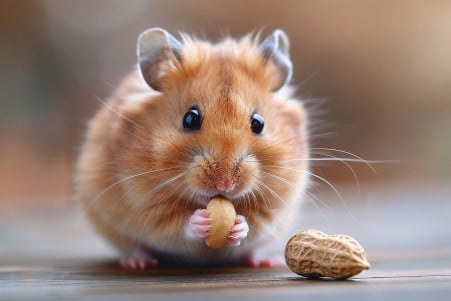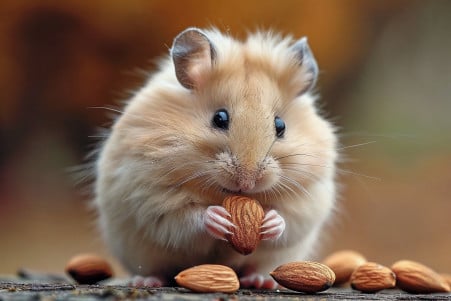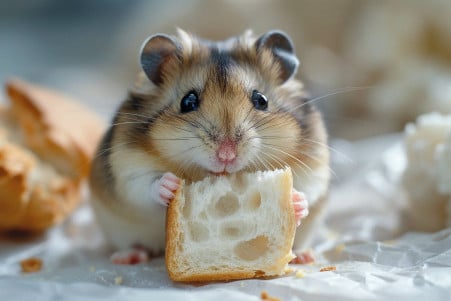Can Hamsters Eat Peanut Butter? A Look at the Risks and Benefits
3 April 2024 • Updated 3 April 2024

If you have a pet hamster, you may be wondering if it's OK to give them a little peanut butter as a special treat. There are some potential benefits and risks to consider. While peanut butter can be a good source of protein and healthy fats for hamsters, it's also high in calories and should only be used as an occasional supplement to their nutritionally balanced regular diet. Overconsumption of peanut butter can lead to obesity and other health problems in these tiny animals.
To help you determine if peanut butter is safe for hamsters, we've reviewed the latest scientific evidence from veterinarians and other animal care experts as well as anecdotal reports from hamster owners. Together, their findings can help you better understand the nutritional value of peanut butter and how it can fit into your hamster's diet. You'll also learn how much peanut butter is safe to give your hamster, what signs of an allergic reaction to look out for, and how to introduce peanut butter to your hamster in a way that minimizes the risk of any negative side effects.
Can hamsters eat peanut butter?
Nutritional Value of Peanut Butter for Hamsters
Peanut butter can offer some nutritional value for hamsters if it's used sparingly as an occasional treat. It is a good source of protein, which is something that, according to The Spruce Pets, hamsters require for growth and maintenance. Peanut butter also has unsaturated fats that can be good for a hamster's diet if they are consumed in small quantities.
As pointed out on Hamsters Portal, peanut butter has vitamins such as vitamin B6, which can help the immune system, and minerals such as potassium, which can help with muscles. It also has vitamin E, which Pet Keen explains can be helpful for hamsters.
That said, peanut butter is also high in calories due to its fat and sugar content. While this can provide energy, it can also lead to obesity in hamsters if it's consumed in excess. All of the sources make it clear that peanut butter should be used sparingly and only as a small part of a balanced, mostly plant-based hamster diet. This is especially important to keep in mind when you're using it as an occasional treat.
How Much and How Often Can Hamsters Have Peanut Butter?
Peanut butter should be given to hamsters in very small amounts and only occasionally. The Ontario Hamster Club recommends spreading a thin layer of natural peanut butter on a piece of wood or mixing it in with other foods to avoid having it get stuck in the hamster's cheek pouches, which can cause dental problems and choking.
The Hamster Forum says that peanut butter should be given no more than once or twice a week as part of a hamster's balanced, mostly plant-based diet. Overconsumption of peanut butter can lead to obesity and other health issues. It's important to watch your hamster closely and stop giving them peanut butter if you notice any adverse effects.
When it comes to portion sizes, you should take into account your hamster's age, size, and other dietary needs. As one member of the Hamster Central community noted, a piece the size of a fingernail is a good place to start for a dwarf hamster. If your hamster handles it well, you can increase the amount, but make sure to keep the portions small and infrequent.
How to Choose the Best Peanut Butter for Hamsters
When selecting peanut butter for your hamster, it's important to choose natural, organic options that don't include any added sugars, salts, or preservatives. The Ontario Hamster Club notes that many store-bought peanut butters have additives that can be dangerous for hamsters.
Make sure to read the labels to find the best options, and avoid peanut butters that have high sugar and salt content. The Hamster Forum also warns against peanut butters that have added oils and hydrogenated fats, which can be very dangerous for your hamster to consume.
As shown in a wikiHow Pet article, natural, smooth peanut butter or "peanut spread" is the best option. Choose organic options that don't have any artificial ingredients to make sure that your hamster can enjoy the benefits of peanut butter without the risks of additives.
Risks and How to Spot Overfeeding Peanut Butter
There are several risks associated with overfeeding peanut butter to hamsters. According to Hamsters Portal, one of the most serious risks is obesity, which can lead to other health problems such as heart disease and diabetes. Because peanut butter is high in fat and sugar, it can lead to rapid weight gain if consumed in large quantities.
Another risk of overfeeding peanut butter is digestive issues, such as bloating, diarrhea, or constipation, as mentioned by Petsolino. The sticky nature of peanut butter can also cause it to get stuck in a hamster's cheek pouches, which can lead to dental problems or even choking.
Hepper also notes that some hamsters may be allergic or sensitive to peanut butter. Signs of an allergic reaction or sensitivity include weight gain, lethargy, and changes in behavior. If any of these signs are noticed, peanut butter should be removed from the hamster's diet, and a vet should be consulted.
To avoid these risks and keep your hamster safe, it's important to monitor their reaction to peanut butter closely when you first introduce it and never give them too much of this high-calorie food. It's important to use peanut butter in moderation and with care when feeding it to hamsters.
How to Add Peanut Butter to Your Hamster's Diet
If you want to add peanut butter to your hamster's diet, it's important to do so in a way that minimizes the risks and ensures that your pet can tolerate and enjoy this food. Hamsters Portal recommends adding peanut butter to your hamster's diet in very small amounts. For example, you can spread a thin layer of peanut butter on a piece of wood or mix it with other foods like fruits and vegetables. This will help ensure that your hamster only eats a small amount of peanut butter and that it won't get stuck in their cheek pouches.
As shown in a wikiHow Pet article, you can also make simple frozen treats by mixing a small amount of natural peanut butter with oats. These treats can be a fun way to give your hamster peanut butter in a controlled way. However, the article notes that you should remove any uneaten treats from the cage because the peanut butter can spoil.
A member of the Hamster Central community recommends starting with a piece of peanut butter the size of a fingernail for a dwarf hamster and increasing the amount if the hamster doesn't have any issues with it. However, if you notice any signs of discomfort or negative reactions, such as lethargy, weight loss, or changes in your hamster's typical behavior, you should stop giving them peanut butter.
It's important to add peanut butter to your hamster's diet slowly and carefully to ensure that you don't negatively impact your pet's health and well-being. By starting with small amounts, watching for signs of a reaction, and giving peanut butter to your hamster as an occasional treat, you can make sure that you're safely introducing this food while still providing your pet with a healthy, balanced diet.
Conclusion: Feed Peanut Butter in Moderation and With Other Foods
While peanut butter can be a source of some important nutrients for your hamster, it should only be fed in very small amounts as an occasional treat. The high fat, sugar, and calorie content of peanut butter can lead to obesity and other health problems if it is overfed. You should also make sure to watch your hamster for any signs of a negative reaction to peanut butter and stop feeding it to them if you notice anything concerning.
The important thing is to make sure that peanut butter is only a small part of a diet that is otherwise made up of a variety of plant-based foods. If you have any concerns or questions about feeding peanut butter or other new foods to your hamster, talk to your vet.
By making sure that you feed your hamster a varied diet that includes peanut butter in moderation, you can make sure that it stays safe for them to eat and that your hamster stays healthy.


